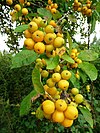Malus orientalis
Appearance
| Malus orientalis | |
|---|---|

| |
| Scientific classification | |
| Kingdom: | Plantae |
| Clade: | Tracheophytes |
| Clade: | Angiosperms |
| Clade: | Eudicots |
| Clade: | Rosids |
| Order: | Rosales |
| Family: | Rosaceae |
| Genus: | Malus |
| Species: | M. orientalis
|
| Binomial name | |
| Malus orientalis | |
| Synonyms[2] | |
|
List
| |
Malus orientalis, the eastern crabapple or Caucasus apple, is a species in the genus Malus found in Bulgaria, Turkey (including East Thrace), the Transcaucasus, and Iran.[2] With its relatively large yellow fruit, it has been consumed by people for millennia, with a string of halved, dried fruit being found in a royal tomb at Ur. Drying the fruit and then rehydrating by boiling cuts the tartness. M. orientalis contributed slightly to the gene pool of domesticated apples, a distant second to Malus sieversii.[3][4]
References
[edit]- ^ Trudy Sev.-Kavk. Inst. Spets. Tekh. Kult. 1(3): 18 (1932)
- ^ a b "Malus orientalis K.Koch". Plants of the World Online. Board of Trustees of the Royal Botanic Gardens, Kew. 2017. Retrieved 17 September 2020.
- ^ Spengler, Robert Nicholas (2019). "Origins of the Apple: The Role of Megafaunal Mutualism in the Domestication of Malus and Rosaceous Trees". Frontiers in Plant Science. 10: 617. doi:10.3389/fpls.2019.00617. PMC 6545323. PMID 31191563.
- ^ Cornille, Amandine; Giraud, Tatiana; Smulders, Marinus J.M.; Roldán-Ruiz, Isabel; Gladieux, Pierre (2014). "The domestication and evolutionary ecology of apples". Trends in Genetics. 30 (2): 57–65. doi:10.1016/j.tig.2013.10.002. PMID 24290193.

